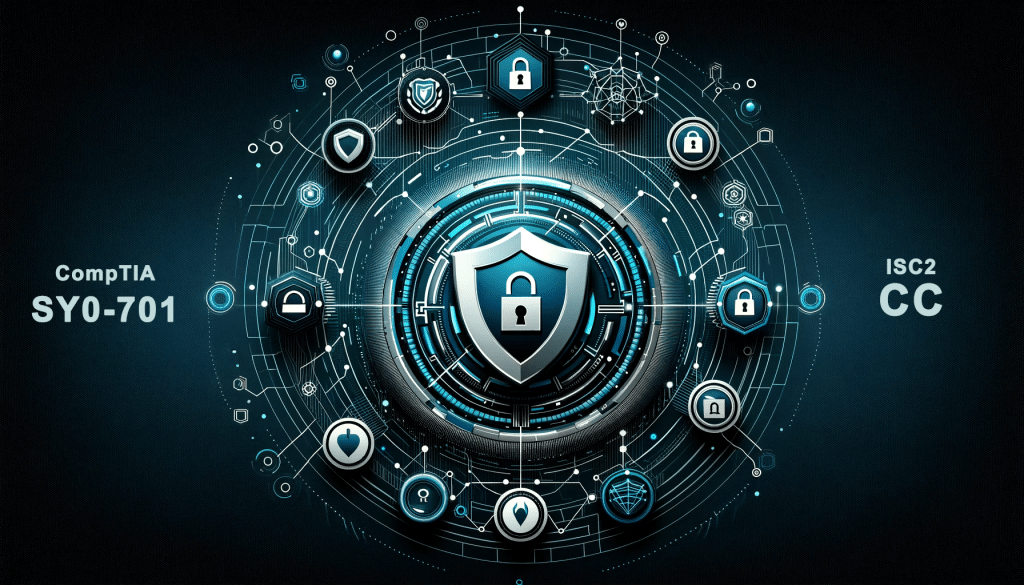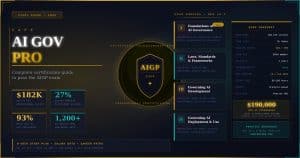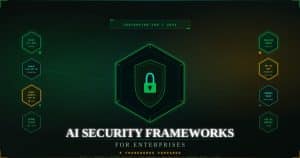Cybersecurity is one of the fastest-growing fields today, with companies across industries prioritizing their security infrastructure. As demand surges, certifications like SY0-701 (CompTIA Security+) and CC (Certified in Cybersecurity by (ISC)²) have become popular choices for those looking to break into the field or advance their careers. But which certification is the right fit for you in 2026? Let’s dive deep and compare both options to help you decide.
Overview of SY0-701 and CC Certifications
What is SY0-701 (CompTIA Security+)?
SY0-701 is an entry-level certification aimed at providing foundational cybersecurity knowledge. It covers a broad spectrum of security-related topics, including network security, threats and attacks, cryptography, risk management, malware analysis and compliance. This vendor-neutral certification is well-recognized across industries and serves as a stepping stone to more advanced credentials.
What is CC (Certified in Cybersecurity by (ISC)²)?
CC, offered by (ISC)², is an entry-level certification that focuses on cybersecurity fundamentals without requiring any prior experience. The certification emphasizes basic concepts such as cybersecurity principles industry standards, policies, and risk management, making it an excellent starting point for individuals new to the field.
Comparison
| Aspect | SY0-701 (CompTIA Security+ 701) | CC (Certified in Cybersecurity) |
| Overview | Entry-level cybersecurity certification that covers fundamental security concepts. | A certification for beginners that focuses on foundational cybersecurity knowledge and skills. |
| Target Audience | Beginners and aspiring cybersecurity professionals. | Individuals new to cybersecurity or those wanting to validate their cybersecurity skills. |
| Focus Areas | Network Security Threats & Attacks Cryptography Risk Management | Security Controls Cybersecurity Terminology Risk Management Security Policies |
| Prerequisites | No formal prerequisites; basic IT knowledge recommended. | No prerequisites; ideal for beginners with little to no experience in cybersecurity. |
| Domains Covered | Threats, Attacks, and Vulnerabilities Security Architecture Risk Management Cryptography Security Operations | Cybersecurity Terminology Network Security Threat Intelligence Risk Management |
| Exam Length | 90 questions; 90 minutes. | 100 questions; 2 hours. |
| Exam Format | Multiple-choice and performance-based questions. | Multiple-choice questions. |
| Exam Fee | $392 (USD). | $200 (USD). |
| Certification Maintenance | Valid for 3 years; requires CEUs (Continuing Education Units). | Valid for 3 years; requires continuing education to maintain certification. |
| Difficulty Level | Moderate; suitable for beginners. | Basic level; designed for those entering the cybersecurity field. |
| Industry Recognition | Widely recognized as a foundational cybersecurity certification. | Gaining recognition, especially for those starting their career in cybersecurity. |
| Job Roles | Security Administrator Network Administrator IT Support Technician | Cybersecurity Analyst Security Administrator IT Specialist |
| Salary Impact | Entry to mid-level salary range ($50,000–$80,000 annually). | Entry-level salary range ($40,000–$70,000 annually). |
| Ideal For | Those looking for a strong foundation in cybersecurity and aiming for entry-level roles. | Individuals starting their cybersecurity career with little to no experience. |
| Vendor | CompTIA | (ISC)² |
SY0-701: What’s in It for You?
Thinking about SY0-701? You’re probably wondering if it’s worth your time and money. Cybersecurity keeps changing, and staying relevant means picking the right certs. The CompTIA Security+ (SY0-701) is a popular choice, especially for those starting out or looking to solidify their cyber security expert skills. But is it the right fit for you? Let’s break it down.
What’s Inside SY0-701?
SY0-701 isn’t just about book knowledge. It covers a broad range of security fundamentals that organizations expect cybersecurity pros to know. We’re talking about areas like:
- Threats, Attacks & Vulnerabilities: New threats show up every day. The exam focuses on real-world attack methods, covering everything from malware to social engineering tactics that hackers use to trick users.
- Security Architecture & Design: It touches on best practices to keep networks and systems secure, focusing on frameworks, policies, and compliance guidelines.
- Implementation: Practical stuff like configuring firewalls, VPNs, and endpoint security is part of the syllabus, helping you understand how security measures are applied in actual environments.
- Operations & Incident Response: Knowing how to detect, respond to, and recover from incidents is critical, and this cert preps you with strategies and processes to deal with cybersecurity events.
- Governance, Risk & Compliance: Regulatory standards like GDPR, HIPAA, and PCI-DSS are covered, so you’ll know what businesses need to follow to stay compliant.
It’s structured to give you access management a solid base, whether you’re new to cybersecurity or have some experience under your belt.
Is the Exam Tough?
SY0-701 isn’t a walk in the park, but it’s manageable with the right prep. CompTIA tweaked the exam to reflect modern cyber threats, so expect scenario-based questions instead of just theory. It’s not just memorizing terms; you’ll need to apply concepts in real-world scenarios.
Here’s what you’re up against:
- Multiple-Choice & Performance-Based Questions: Some are straightforward, but the hands-on style questions require you to troubleshoot or configure security settings.
- 90-Minute Time Limit: You get around an hour and a half to tackle about 90 questions, so time management is key.
- Passing Score: You’ll need a 750 on a scale of 100-900, meaning partial knowledge won’t cut it, you need a strong grasp of all domains.
If you’re good with hands-on learning and practical application, it might not feel too overwhelming. However, if you’re more used to theory-heavy certs, the performance-based questions could catch you off guard.
Having a solid study plan and the right resources can make tackling the SY0-701 exam much easier. For an in-depth look at exam objectives, study tips, and preparation strategies, check out this comprehensive guide for aspiring security professionals. To reinforce your prep, try a free Security+ exam question and see how well you apply concepts in a test-style format.
What Doors Does SY0-701 Open?
Certs are meant to boost careers, and SY0-701 does just that for the right crowd. Many entry-level cybersecurity jobs list it as a preferred or required qualification. It’s vendor-neutral, meaning it doesn’t tie you to specific tech, making it valuable across different industries.
Typical roles that benefit from Security+ include:
- Security Analyst: Companies need people who can monitor networks, identify threats, and respond fast. This cert gives you the foundation to handle that.
- SOC (Security Operations Center) Team Member: If you’re interested in working in an operations center, this cert helps with monitoring, log analysis, and response tactics.
- System Administrator with Security Focus: Admins managing IT infrastructure can use the skills gained from this cert to improve their security posture.
- Compliance & Risk Analyst: Since governance and compliance are part of the exam, you can branch into policy enforcement and auditing roles.
Certs are meant to boost careers, and SY0-701 does just that for the right crowd. Many entry-level cybersecurity jobs list it as a preferred or required qualification. It’s vendor-neutral, meaning it doesn’t tie you to specific tech, making it valuable across different industries. You can explore more about the jobs here
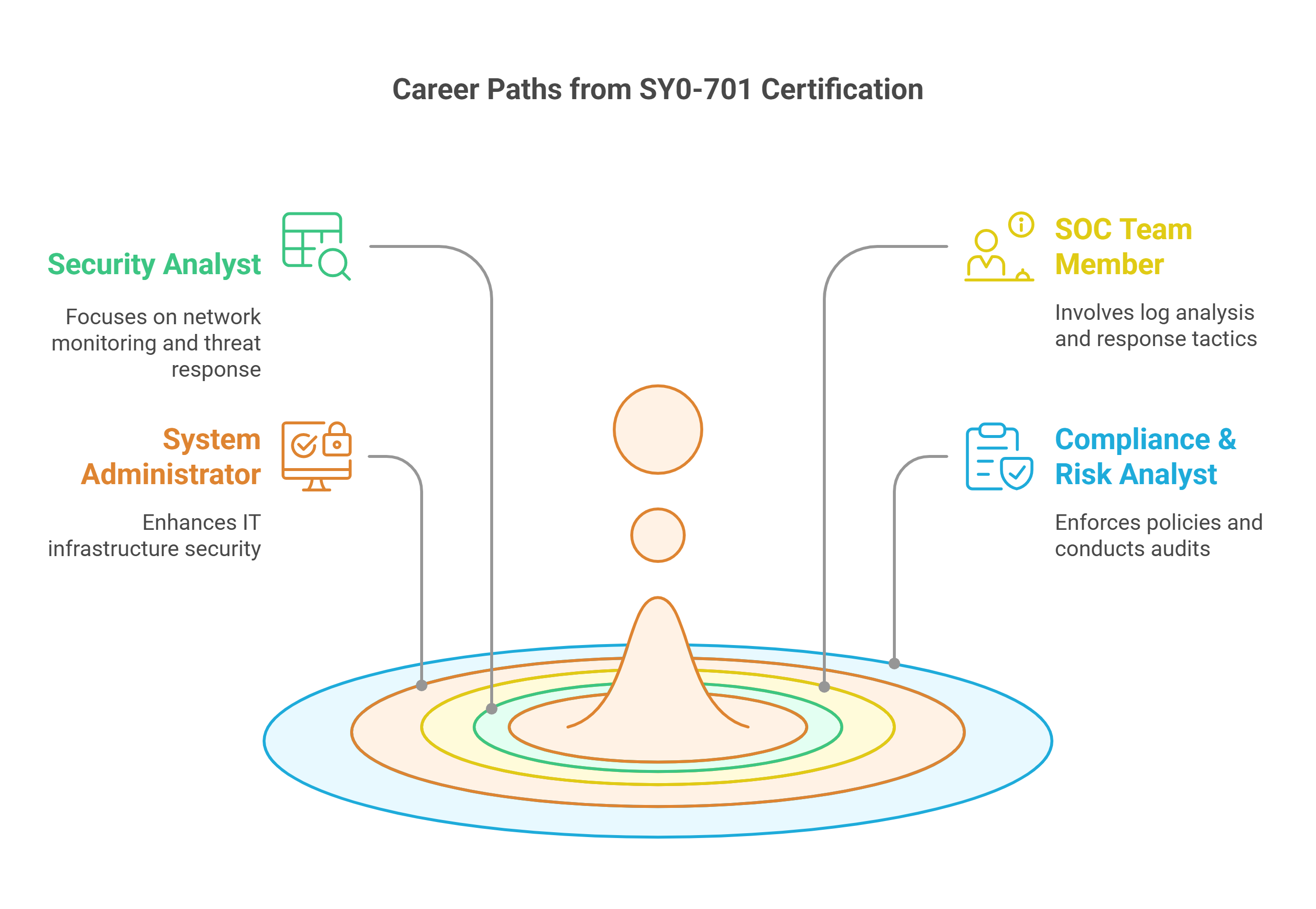
Entry-level salaries with this and best cybersecurity certifications typically range between $60,000 to $90,000 depending on your location and experience level. It’s a good stepping stone if you’re looking to climb the cybersecurity ladder.
Is It Worth the Effort?
If you’re starting fresh in cybersecurity, SY0-701 is one of the best stepping stones. It’s widely recognized, covers practical skills, and can help you land interviews for security-related roles. However, it’s not the be-all and end-all. Some professionals move on to more specialized certs like CISSP or CEH once they gain experience.
For those switching careers into certified information security manager, this cert makes sense. It helps you prove your knowledge without needing years of experience. On the flip side, if you’re already working in IT security and looking for deeper specialization, you might find it too basic.
Where Does It Fit in Your Career Path?
SY0-701 sits at the beginner-to-intermediate level. It’s not an advanced cert, but it’s not too basic either. It’s perfect for:
- Fresh IT Grads: If you have some networking knowledge and want to move into security, this gives you a good foundation.
- Help Desk Techs Looking to Pivot: If you’re already working in IT support, this cert helps transition into security-focused roles.
- Professionals with Basic Security Knowledge: If you know the basics but want a structured cert to prove your skills, it’s a good fit.
Once you have SY0-701, you can aim for more advanced certs like CISSP, CEH, or even more cloud security-focused certs like AWS Security Specialty.
Should You Take It?
If you’re eyeing a cybersecurity role but unsure where to start, SY0-701 is a solid pick. It covers a wide range of security topics without being too overwhelming. Plus, it’s a globally recognized certification by employers globally. However, if you’re more interested in ethical hacking or penetration testing, you might want to look at other certs down the line.
At the end of the day, it’s about what aligns with your career goals. If you’re serious about cybersecurity and want to get a foot in the door, SY0-701 is a worthy investment.
CC Certification: Is It More Than Just Another Security Credential?
If you’re considering the Certified in Cybersecurity (CC) cert from ISC2, you might be wondering if it’s worth your time in 2026. Cybersecurity is booming, and with so many certs out there, it’s easy to feel overwhelmed. Some certs focus on deep technical knowledge, while others aim to cover broad security concepts, CC falls into the latter. It’s an entry-level cert, but does that make it any less valuable? Let’s dive in and see if it’s the right choice for you.
Why CC ISC2 Stands Out in 2026
At first glance, CC might seem like just another cert in the crowd, but ISC2 has positioned it as a key stepping stone for anyone looking to break into cybersecurity. Here’s why it’s getting attention:
- Recognized Globally: ISC2, the same organization behind CISSP (a gold standard in cybersecurity), backs CC. That credibility carries weight with employers.
- Vendor-Neutral: It’s not tied to any specific technology or platform, making it applicable across various job roles and industries.
- Focus on Cybersecurity Basics: Unlike other certs that dive straight into complex topics, CC focuses on foundational security principles, making it perfect for beginners or career switchers.
- Pathway to Advanced Certs: If you’re aiming for CISSP or SSCP later on, CC is a great starting point to build confidence and knowledge.
What really makes CC stand out is its simplicity? it’s designed for those with little to no experience. That’s rare in the cybersecurity world, where most certs assume you already know the basics.
What’s in the CC Exam?
CC focuses on five key areas, all designed to give you a solid grounding in cybersecurity fundamentals. Unlike some certs that overwhelm you with technical jargon, CC keeps things practical and easy to digest. Here’s what you need to know:
- Security Principles: Covers fundamental security concepts like confidentiality, integrity, and availability (CIA triad). Expect topics around risk management, security governance, and security controls.
- Business Continuity (BC) & Disaster Recovery (DR): Teaches the importance of planning for disruptions and how to keep operations running when things go wrong.
- Access Controls: Deals with authentication, authorization, and accounting (AAA), helping you understand how organizations control who gets access to what.
- Network Security: Covers basics of firewalls, VPNs, intrusion detection, and common threats to networks.
- Security Operations: Focuses on security monitoring, incident response, and managing security events effectively.
You can also check your readiness with a free CC practice question to get a feel for the exam’s style and coverage.
Mastering these domains is key to passing the ISC2 CC exam with confidence. A structured approach with the right study strategies can make a significant difference in exam performance. Understanding how to effectively prepare for the CC exam is essential for success and can help streamline your learning process.
Exam Format and What to Expect
The CC exam isn’t too complicated in terms of structure. Here’s a quick breakdown:
- Number of Questions: 100 multiple-choice questions
- Time Limit: 2 hours
- Passing Score: 700 out of 1000
- Delivery: Online proctored or test center
The questions mostly focus on concepts rather than deep technical configurations security vulnerabilities. You’ll need to have a clear understanding of security principles rather than hands-on skills. If you’ve done any basic IT training or have a general interest in security, it should be manageable.
CC vs. SY0-701: Which One Is Easier?
This is where things get interesting. Both certs aim at entry-level cybersecurity knowledge, but they have different approaches.
CC might be easier if:
- You’re completely new to cybersecurity and prefer a gentler introduction.
- You like concepts and frameworks rather than hands-on practical skills.
- You’re looking for a cert that’s shorter and more straightforward.
SY0-701 might be harder because:
- It has a wider scope, covering more technical ground.
- The exam includes performance-based questions, which require practical application.
- There’s more emphasis on real-world security implementations, which can be challenging for beginners.
That said, “easy” depends on your background. If you’re coming from an IT support role, SY0-701 might not feel too tough. If you’re completely new, CC can feel more approachable.
How CC Fits into the Job Market
In 2026, the demand for cybersecurity professionals continues to grow, and many organizations are looking for people with solid foundational knowledge. While CC isn’t a ticket to high-level security roles, it’s enough to get your foot in the door.
Employers see CC as cloud security proof that you understand security basics and are serious about the field. It’s especially useful for:
- Entry-level Security Roles: Positions like security analyst, SOC analyst (Tier 1), and IT security assistant often list CC as a preferred qualification.
- IT Professionals Transitioning into Security: If you’re an IT support person or sysadmin, adding CC to your resume shows you’re ready to step into security-focused roles.
- Compliance-Focused Jobs: Since CC covers governance and security frameworks, it’s helpful for compliance or risk management roles.
Learn more about the Certified Cybersecurity (CC) jobs here: https://certempire.com/cc-job-roles-and-salary-insights/
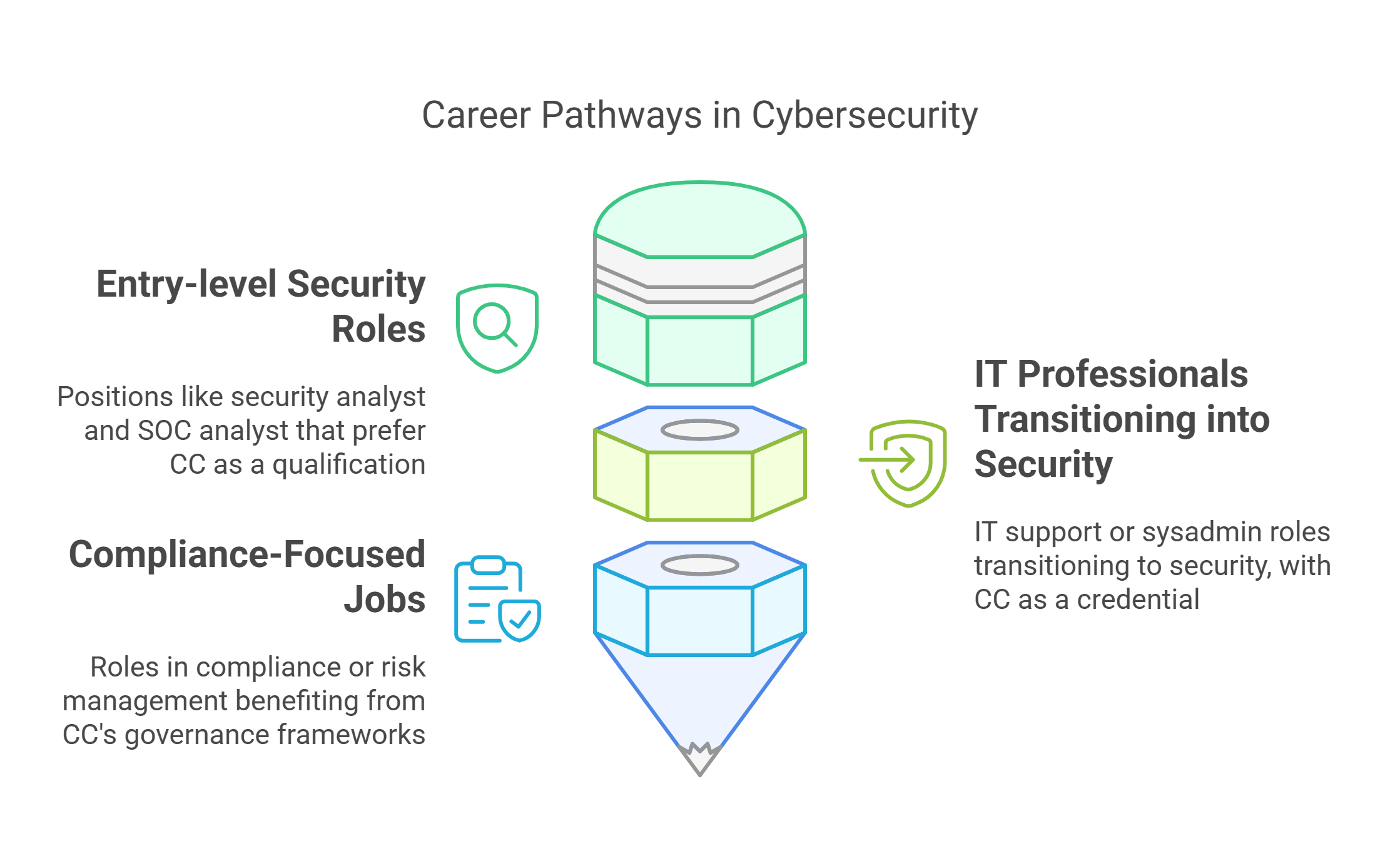
However, if you’re aiming for more technical hands-on jobs like penetration testing or threat hunting, CC alone won’t cut it. You’ll need to look at more specialized certs.
Is CC Worth Getting in 2026?
CC is worth considering if you’re trying to break into cybersecurity and want a simple, no-fuss cert to validate your knowledge. It’s affordable and widely recognized, and it doesn’t take forever to prepare for a certified cloud security professional.
But, if you’re aiming for a deeper technical role right away, you might want to skip CC and jump straight to something like SY0-701, CEH, or even cloud-based security solutions for certs.
At the end of the day, it all comes down to your career goals. If you’re looking for an entry-level cert that lays down the groundwork for bigger things, CC is a solid bet.
SY0-701 vs CC Career Value: Which Certification Boosts Your Resume More?
Choosing between SY0-701 and CC ISC2 can feel like a tough call, especially if you’re just stepping into cybersecurity. Both certs are targeted at beginners, but they aren’t exactly the same when it comes to career impact. If you’re wondering which one can make your resume stand out and lead to better opportunities, let’s break it down and see how they stack up.
Which Certification Fits Entry-Level Cybersecurity Jobs Better?
At the beginner level, your cert choice can influence the types of jobs you qualify for.
SY0-701 is better suited for roles like:
- Security Analyst (Entry-Level)
- SOC Analyst (Tier 1)
- Network Security Technician
- IT Support with Security Focus
- System Administrator with Security Responsibilities
It’s the go-to cert for entry-level positions that require day-to-day security operations, such as monitoring threats, configuring security tools, and responding to security incidents themselves.
CC aligns well with roles like:
- IT Auditor (Junior Level)
- Compliance Assistant
- Cybersecurity Awareness Coordinator
- Risk Management Assistant
- Security Operations Support
CC is a great starting point for those who are more interested in security policies, compliance work, security audits and governance rather than technical security operations.
If you’re aiming to be hands-on and work with firewalls, security logs, and endpoint protection, SY0-701 is the better choice. If you prefer a broader understanding of fundamental cybersecurity principles and want to grow into compliance or risk management, CC can be a good start.
Salary Expectations: Which Cert Gives You an Edge?
The salary impact of a cert depends on your experience, job role, and location, but on average:
With SY0-701:
- Entry-level roles typically start around $60,000–$80,000 annually in the U.S.
- With a couple of years of experience, Security+ holders can earn upwards of $90,000, especially in roles like SOC analyst or security engineer.
- In government and defense jobs, SY0-701 cert holders often meet the baseline pay expectations quickly due to DoD compliance.
With CC:
- Salaries for CC-certified professionals start around $50,000–$70,000, depending on the role.
- Since CC is relatively new, it might not command higher salaries yet compared to more established certs.
- It can be a great resume booster for IT professionals transitioning into security, which could lead to salary increases over time.
Overall, SY0-701 offers better earning potential in the short term due to its established reputation and alignment with in-demand roles. CC, while valuable, might require additional certs or experience to push salaries higher.
SY0-701 vs CC Exam Difficulty: What’s Tougher to Crack?
Some people breeze through one, while others struggle with the other. So, how do they compare in terms of difficulty? Let’s break it down so you can figure out which one suits your skills and learning style.
The biggest difference here? SY0-701 demands a more hands-on, technical approach, while CC sticks to concepts and principles. If you’re better at understanding security fundamentals without diving into tools and configurations, CC might feel easier. But if you’re comfortable with practical scenarios and troubleshooting, SY0-701 will make more sense.
Practical vs. Theoretical Challenges
SY0-701 (Security+) leans heavily towards practical knowledge. Expect questions that test your ability to:
- Configure and troubleshoot security settings (e.g., firewalls, access controls).
- Analyze threat intelligence reports and make security decisions.
- Respond to cybersecurity incidents and apply security controls.
CompTIA’s performance-based questions require actual problem-solving, making the exam feel tougher if you’re not hands-on. You’ll have to apply what you know, not just memorize definitions.
CC (Certified in Cybersecurity) takes a more theoretical approach. The questions mostly focus on:
- Security principles like confidentiality, integrity, and availability (CIA triad).
- Compliance frameworks and security governance concepts.
- Best practices for business continuity and access control.
If you have a good grasp of security fundamentals and can think conceptually, CC won’t be too tough. But, if you struggle with memorization and abstract concepts, it might feel trickier than expected.
Pass Rates and What They Reveal
Pass rates aren’t always published, but industry insights suggest that:
- SY0-701 has a lower pass rate compared to CC. Many candidates find the practical nature of the exam challenging, especially those without hands-on experience.
- CC sees higher pass rates, partly because it’s designed for beginners and covers broad, foundational concepts rather than deep technical skills.
This doesn’t mean CC is a cakewalk. Some candidates struggle with the way ISC2 phrases questions, which can be tricky if you’re not used to their exam style. Security+ is more direct, while CC might require careful reading to understand what’s being asked.
Are Practice Tests Enough to Pass?
Practice tests are a great way to prepare for both exams, but their effectiveness depends on the exam format.
For SY0-701:
- Practice tests help, but they aren’t enough. The performance-based questions need real understanding, not just memorization.
- Hands-on labs and simulations are key to mastering the practical parts of the exam.
- Focus on understanding concepts deeply rather than just answering practice questions.
For CC:
- Practice tests are more effective since the exam is mostly theoretical.
- Understanding definitions, concepts, and compliance frameworks will help you sail through.
- ISC2-style practice questions are important because their wording can be tricky.
If you’re relying only on practice tests to pass SY0-701, you might be in for a surprise. CC, on the other hand, is more forgiving if you’ve done enough practice quizzes and reviewed key concepts. Cert Empire could provide you with the best exam dumps to straighten your prep.
SY0-701 or CC – Which One Should You Go For?
Choosing between SY0-701 (CompTIA Security+) and CC (Certified in Cybersecurity by ISC2) depends on where you’re headed in cybersecurity. Both certs target beginners, but they serve different purposes and career paths. So, before you dive in, let’s break it down to help you decide which one makes more sense for your goals and learning style.
What Are Your Career Goals?
Your career ambitions should shape your decision. If you’re aiming to break into technical cybersecurity roles, you’ll want a cert that proves hands-on ability. On the flip side, if you’re interested in security management, policy, or compliance, a cert that focuses on conceptual knowledge might be the better pick.
Go for SY0-701 if you:
- Want to work in technical roles like Security Analyst, SOC Analyst, or Network Security Engineer.
- Are planning to move into penetration testing or ethical hacking in the future.
- Need a cert that aligns with job listings in security operations, IT infrastructure, and compliance.
- Prefer hands-on cybersecurity roles involving tools and technical setups.
CC might be a better fit if you:
- Are looking for a starting point into cybersecurity without deep technical knowledge.
- See yourself in roles related to risk management, governance, and compliance.
- Want an easier entry into the cybersecurity field before pursuing more advanced certs like CISSP.
- Work in IT already and want to transition gradually into cybersecurity.
It’s all about where you see yourself a few years down the road. SY0-701 tends to appeal more to those aiming for hands-on roles, while CC works well for those who prefer a broader understanding of the security protocols, frameworks and policies.
Frequently Asked Questions!
Is SY0-701 better than CC for cybersecurity beginners?
It depends on your goals, SY0-701 is better for those seeking technical roles, while CC is ideal for those focused on cybersecurity fundamentals and compliance.
What are the job prospects after getting the CC certification?
CC can help land entry-level certified cybersecurity professionals for roles in compliance, governance, and IT security support, but additional experience or certs may be needed for more technical positions.
How long does it take to prepare for the SY0-701 exam?
Most candidates need around 2-3 months of study, depending on their prior IT knowledge and experience.
Do employers prefer one of certification exam over the other?
SY0-701 is often preferred for technical roles, while CC is valued for compliance and security awareness positions.
Can I take both SY0-701 and CC for a stronger resume?
Yes, having both certs can showcase a well-rounded skill set, covering both technical and theoretical cybersecurity knowledge.
How often do these certifications need to be renewed?
SY0-701 requires renewal every 3 years, while CC has an annual maintenance requirement with continuing education credits.
Is hands-on experience necessary to pass the CC exam?
No, CC focuses more on concepts and principles, so hands-on experience isn’t mandatory, but it helps with real-world understanding.
What’s the cost difference between SY0-701 and CC?
SY0-701 costs around $392, while CC is more affordable, typically priced under $200, making it a budget-friendly option for beginners.

